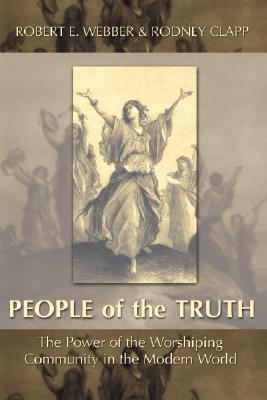- Bíblia
- Leia a Bíblia
- Versões da Bíblia
- Verso do dia
- Planos de Leitura
- Versos por Tópico
- Books of the Bible
- Imagens bíblicas
- Estude
- Comentários
- Concordâncias
- Dicionários
- Enciclopédias
- Sermões
- Bible Atlas & Maps
- BP Wiki
- Devocionais
- Devocionais de hoje
- Light of the World
- Todos os devocionais
- Inspirational Quotes
- Mais
- Picture Quotes
- Videos
- Inspirador
- Estudo da Bíblia
- O que a Bíblia diz
- Bible Q&As
- Daily Bread
- Bible by Genre
- Bible Stories
- Random Bible Verse
- Comunidade
- Store
People of the Truth: The Power of the Worshipping Community in the Modern World
by Robert E. Webber
In this provocateive book, a prominent theologian and a leading Christian editor speak to all Christians who have grown mistrustful of the church's involvement in religio-political power-plays and are seeking the way home. Robert E. Webber and Rodney Clapp examine the dilemma so many Christians face--what to do if you are an enthusiast for neither the New Right nor the Old Left but still take seriously the church's social and political responsibility. 'People of the Truth' offers a biblical solution to this perplexing question. The authors show how American Christians have come to depend on the nation, rather than the church, as their primary instrument of social change and communal influence. They call for the church to move beyond the dead end of civil religion to affirm the authentic role of the worshiping community in effecting social change. The church should dare to lay down its life, the authors write, to give up its ill-begotten political leverage; to turn aside from success and stop counting heads (or dollars); to stand at the side of forgotten poor and oppressed; to be a sign and a witness of humanity's insufficiency and God's all-sufficiency. Drawing upon the works of many esteemed theologians and historians, the authors trace the growth of Christianity and offer a fresh apporach to the history of the church in the world. They reveal how the church's identity and vision have become confused, how they can be recovered, and how Christians--by living out their distinctive story as a worshiping community--can heal society's ills. 'People of the Truth' provides concrete examples of how the church, by realigning itself with its Christ-centered mandate, can effectively respond to such urgent problems as poverty, drug abuse, violence, pornography, AIDS, and the ever-present threat of nuclear war. Here is at once a summons and a guide for the church to become in fact what it has always been ideally: the only people charged with proclaiming this Christ . . . a people of the truth.
BUY NOW
Paperback, 144 pages
Published February 6th 2001 by Wipf & Stock Publishers (first published October 1988)
tags: religion
Se inscrever
© 2025 Bibleportal.com Todos os direitos reservados.

Robert E. Webber (1933 - 2007)
was an American theologian known for his work on worship and the early church. He played a key role in the Convergence Movement, a move among evangelical and charismatic churches in the United States to blend charismatic worship with liturgies from the Book of Common Prayer and other liturgical sources. Webber began teaching theology at Wheaton College in 1968. Existentialism was the primary focus of Webber's research and lectures during his first years at Wheaton. However, he soon shifted his focus to the early church. In 1978 he wrote Common Roots, a book that examined the impact of 2nd-century Christianity on the modern church.In 1985 Webber wrote Evangelicals on the Canterbury Trail: Why Evangelicals Are Attracted to the Liturgical Church, in which he described the reasons behind his own gradual shift away from his fundamentalist/evangelical background toward the Anglican tradition. Webber faced an enormous amount of criticism from evangelicals in response to this book. Nevertheless, his work was highly influential, and his ideas grew in popularity in evangelical circles. During the latter half of his life, Webber took a special interest in Christian worship practices. He wrote more than 40 books on the topic of worship, focusing on how the worship practices of the ancient church have value for the church in the 21st century postmodern era. Among his books are Ancient-Future Worship, Ancient-Future Faith, Ancient-Future Time, Ancient-Future Evangelism, The Younger Evangelicals, and The Divine Embrace.
... Show more